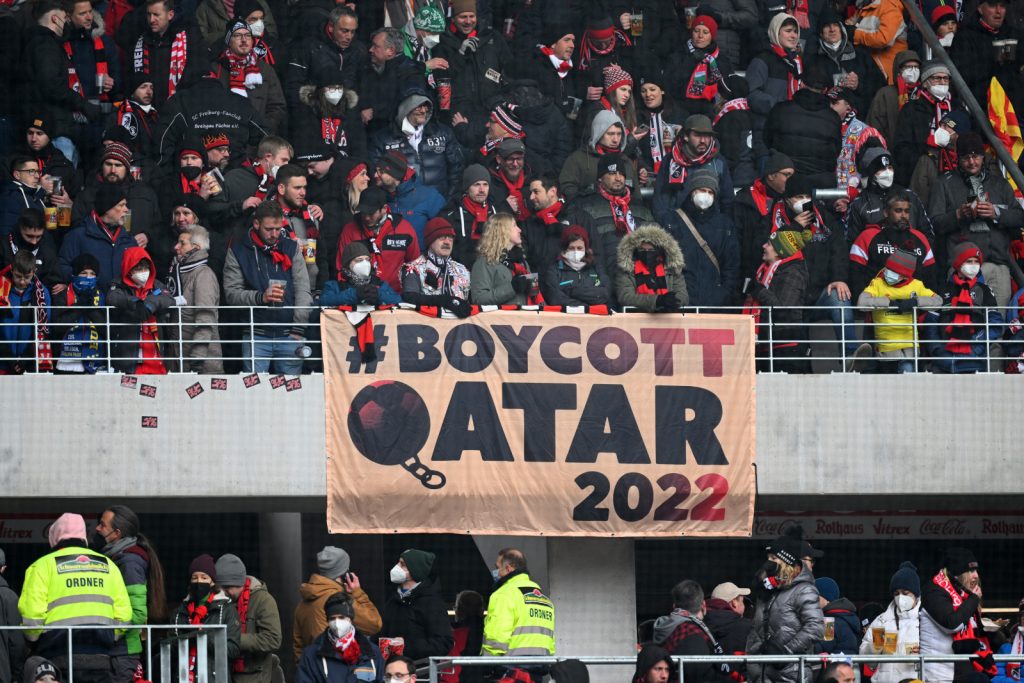Qatar needed a huge number of workers to build stadiums in the desert for the World Cup. A study reports the human cost to migrant workers. (Sean Gallup/Getty Images)
Qatar is not a football powerhouse. The first Arab country to host a world cup can do so because it has vast wealth, the ambition to build 60 000-seater stadiums in the desert, and a pool of workers from poorer countries to do the work.
The human cost of that was made clear in a report by the Equidem and Global Labour Justice-International Labour Rights Forum.
We Work Like Robots: Discrimination and Exploitation of Migrant Workers in Fifa World Cup Qatar 2022 Hotels was published last month and alleges discrimination and exploitation of migrant workers.
Women and men from Africa and Asia working at the hotels describe a raft of violations including sexual harassment, nationality and gender-based discrimination, wage theft, health and safety risks, sudden loss of employment and illegal recruitment.
Wanthaza Mughogho, a Malawian, says he witnessed the abuse and labour malpractices documented in the report.
He says in February 2020 he resigned from the hotel where he worked to join another company, and asked it to transfer his visa to his new employer, or give him a National Occupational Classification.
Instead, they cancelled his visa. “I had 30 days to leave the country.”
But then Covid-19 came and Qatar’s airports were closed. He couldn’t leave.
This didn’t stop his previous employer reporting him to the government’s “search and follow-up” immigration unit. He didn’t know this and, once the airports re-opened, he bought a return ticket to Malawi so he could get a new visa for his new job.
He was arrested at the airport and spent two nights in a detention centre. To leave, he had to accept deportation and a five-year ban.
Mughogho says he met a lot of other Africans and Asians in the centre who had been detained and were waiting for their deportations.
 Not just us: Nepali workers rest on thin mattresses in a labour camp in Doha. Workers from developing countries risk exploitation and abuse in the region, studies say. Photo: Corbis/Getty Images
Not just us: Nepali workers rest on thin mattresses in a labour camp in Doha. Workers from developing countries risk exploitation and abuse in the region, studies say. Photo: Corbis/Getty Images
“Their stories were similar,” he says and explains the one way workers are abused in Qatar, First, people are promised lucrative jobs in the country by recruitment agencies. On arrival, their passports are taken away from them and then their salaries are drastically reduced. They cannot change jobs. If they run away to find better paying work, they are reported to immigration, arrested and put in a detention centre.
“Some have been there for weeks and some for months,” he says.
Malawi’s minister of labour, Vera Kamtukule, said that reading through the report broke her heart and that although her government could not stop labour migration, it should work to ensure that it happens within the law. “The ideal situation for us is that we should have a bilateral agreement that is signed between ourselves and the countries where the people go to work.”
In the case of Qatar, she said there was no bilateral agreement in place between the two because Qatar was previously not a destination for Malawian labourers. “We are pursuing it. And with the World Cup preparations underway, we want to pursue this agreement.”
Mpilo Nkomo, the country director for the International Organisation for Migration in Malawi, said that in the absence of bilateral labour agreements it is difficult for Qatar authorities to enforce compliance on migrant workers protection in line with what their home country considers acceptable. “It might even take a long time to appreciate the abuses,” he said.
 Boy-Qatar: Freiburg supporters call for boycott of the Fifa World Cup in Qatar. Photo: Matthias Hangst/Getty Images
Boy-Qatar: Freiburg supporters call for boycott of the Fifa World Cup in Qatar. Photo: Matthias Hangst/Getty Images
On their part, the Qatari government says it has done more than any other country in the region to improve workers’ rights. Aamer Elsayed Hassan, an official from the Qatari ministry of information, said that in accordance with international standards, new laws had been introduced to prevent abuse and exploitation in the labour market and, as a result, “the number of offences has declined year-on-year”.
He added that Qatari labour inspectors now have the capacity to do “thousands of inspections” and that improvements in its wage protection system now protect 96% of eligible workers. “The reality is that no other country has come so far so quickly,” he said, reiterating Qatar’s assertion that systemic reform does not happen overnight and shifting the behaviour of every company takes time.
Fifa said it “does not accept any abuse of workers by companies involved in the preparation and delivery” of the World Cup. It was implementing “unprecedented due diligence” to protect workers and has “actively pushed for the implementation of broader labour reforms that apply to all companies and projects across the country and benefit all workers in Qatar”.
This article first appeared in The Continent, the pan-African weekly newspaper produced in partnership with the Mail & Guardian. It’s designed to be read and shared on WhatsApp. Download your free copy here.